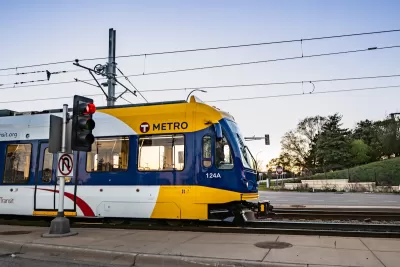The agency is pairing with nonprofit partners to provide on-site services and resources to riders and boosting fare enforcement without police involvement.

Minnesota’s Metro Transit agency is implementing a public safety program aimed at reducing open drug use on transit vehicles, which riders cite as a top reason for feeling unsafe, as well as enforcing fare collection, writes Jared Brey in Governing.
As Brey explains, “Pandemic-era ridership losses reduced social pressure on buses and trains, and led to increased smoking and drug use not just in the Twin Cities but all over the U.S.” To improve safety, Metro Transit launched its Transit Service Intervention Project, which partners with nonprofit service providers to “offer everything from on-the-spot health care from registered nurses to housing assistance to mental health and addiction services.”
A second phase of the plan, the Transit Rider Investment Program, “involves Metro personnel — not police — enforcing payment on transit vehicles by handing out fines and citations to fare-jumpers.”
Sam Rockwell, executive director of Move Minnesota, says the programs could help improve rider perception and increase ridership because, “More than anything else, full trains and buses are what will keep the system feeling safe.”
FULL STORY: Minnesota's Top Transit Agency Tries New Approaches to Public Safety

Planetizen Federal Action Tracker
A weekly monitor of how Trump’s orders and actions are impacting planners and planning in America.

The Simple Legislative Tool Transforming Vacant Downtowns
In California, Michigan and Georgia, an easy win is bringing dollars — and delight — back to city centers.

San Francisco's School District Spent $105M To Build Affordable Housing for Teachers — And That's Just the Beginning
SFUSD joins a growing list of school districts using their land holdings to address housing affordability challenges faced by their own employees.

In More Metros Than You’d Think, Suburbs are Now More Expensive Than the City
If you're moving to the burbs to save on square footage, data shows you should think again.

The States Losing Rural Delivery Rooms at an Alarming Pace
In some states, as few as 9% of rural hospitals still deliver babies. As a result, rising pre-term births, no adequate pre-term care and "harrowing" close calls are a growing reality.

The Small South Asian Republic Going all in on EVs
Thanks to one simple policy change less than five years ago, 65% of new cars in this Himalayan country are now electric.
Urban Design for Planners 1: Software Tools
This six-course series explores essential urban design concepts using open source software and equips planners with the tools they need to participate fully in the urban design process.
Planning for Universal Design
Learn the tools for implementing Universal Design in planning regulations.
Smith Gee Studio
City of Charlotte
City of Camden Redevelopment Agency
City of Astoria
Transportation Research & Education Center (TREC) at Portland State University
US High Speed Rail Association
City of Camden Redevelopment Agency
Municipality of Princeton (NJ)





























